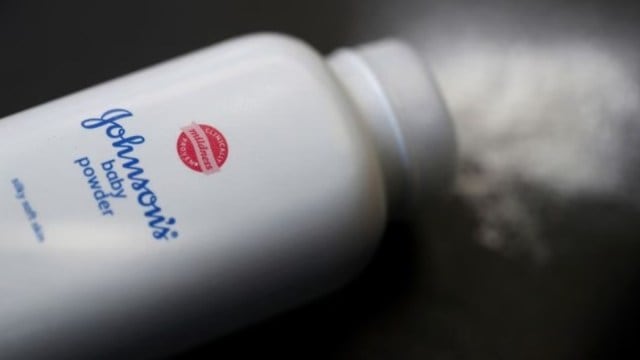3,000 people sue Johnson & Johnson in UK over baby powder cancer risks, claim firm ‘concealed’ info for decades
In 2022, Johnson & Johnson announced it would stop selling and making talc-based baby powder globally.
 Tremolite and actinolite, in their fibrous form, are classified as asbestos, which are linked to potentially deadly cancers. (Photo: Getty Images/Justin Sullivan)
Tremolite and actinolite, in their fibrous form, are classified as asbestos, which are linked to potentially deadly cancers. (Photo: Getty Images/Justin Sullivan) About 3,000 people have filed a legal claim in the UK against pharmaceutical giant Johnson & Johnson (J&J), accusing the firm of knowingly selling baby powder contaminated with cancer-causing minerals, called asbestos.
According to the BBC, the lawsuit brought by KP Law, against J&J and its subsidiary Kenvue Ltd, alleges that the US pharma company was aware as early as the 1960s that its mineral-based talcum powder contained fibrous forms of talc, as well as tremolite and actinolite. The lawyers said J&J “concealed” the risk to the public for decades, instead of issuing warnings.
Tremolite and actinolite, in their fibrous form, are classified as asbestos, which are linked to potentially deadly cancers.
The lawsuit demands all its subsidiaries should be held liable, as it estimates the claims amount to more than £1bn, according to the report. Lawyers for the claimants said it could become “the largest product liability case in British history.”
In 2022, J&J announced it would stop selling and making talc-based baby powder globally, two years after it ended sales in the US and Canada, following tens of thousands of lawsuits by consumers claiming its talc products caused them to develop cancer.
What does the lawsuit allege?
Michael Rawlinson KC, appearing for the people, said in court documents that “there exist very few, if any, commercially exploited talc deposits in the world which do not contain asbestos and that all of the mines supplying the defendants contained asbestos,” The Guardian reported.
The company “suppressed information that might indicate that baby powder was contaminated with asbestos”, Rawlinson added.
He said J&J “lobbied regulators” to enable the continued sale of its talc product, and sponsored studies in an effort to “downplay the dangers” to human health.
J&J “acted in bad faith, to protect the reputation and profit-making potential of baby powder and the goodwill attached to their name”, Rawlinson said.
Moreover, the UK lawsuit alleged that since the early 1970s, J&J executives pushed US regulator the Food and Drug Administration (FDA) to accept lower sensitivity standards so that tests did not pick up on small amounts of asbestos fibres. It advocated for talc testing standards that tolerated up to 1 per cent asbestos contamination, denying more sensitive testing standards.
J&J’s response to the lawsuit
Johnson & Johnson, however, denied the allegations. Kenvue spokesperson said the talc used in baby powder complied with regulations, did not contain asbestos, and does not cause cancer.
Kenvue said, “We sympathise deeply with people living with cancer. We understand that they and their families want answers – that’s why the facts are so important,” according to The Guardian.
“The safety of Johnson’s Baby Powder is backed by years of testing by independent and leading laboratories, universities and health authorities in the UK and around the world… The high-quality cosmetic grade talc that was used in Johnson’s Baby Powder was compliant with any required regulatory standards, did not contain asbestos, and does not cause cancer,” Kenvue added in its statement.
‘It smelt nice and was soft and lovely’
63-year-old Siobhan Ryan, describing her trust for the J&J product, told BBC: “My mother used it and I used it. It smelt nice and was soft and lovely. When my babies were born I used it on them. I thought I was doing my best for them.”
“It was such a shock. We just hugged and cried. I couldn’t believe what I was hearing when the doctor told me I had stage 4 ovarian cancer.”
Ryan, who claims her cancer was caused by J&J powder, went through rounds of chemotherapy, a bout of sepsis, and a major surgery of her abdomen to be able to survive. “They knew it was contaminated and still they sold it to new mums and their babies,” Siobhan told the media organization.
75-year-old Janet Fuschillo, another claimant, told The Guardian she had used J&J’s baby powder since the 1960s and was diagnosed with ovarian cancer seven years ago.
She said: “I used talc on myself and all four of my children … It’s a source of great concern and anger that I used talc on my children.”
Claimant Patricia Angell said her husband, Edward, died in 2006 aged 64, a few weeks after being diagnosed with mesothelioma, robbing him of 19 years of life, and her children of a father, The Guardian quoted.
Mesothelioma, a form of cancer, is almost always caused by asbestos exposure, and commonly developed in the lining of the lungs after people inhale the microscopic mineral fibres, according to the National Health Service (NHS). It typically develops more than 20 years after exposure to asbestos.







